In 2004, Peter Gabriel launched into his Nonetheless Rising Up tour, staging a extra intimate model of the earlier 12 months’s Rising Up exhibits. He sat down with Basic Rock to inform us about his plans, and talked at size about his complete profession, from Genesis to solo stardom and past.
Lately Peter Gabriel is a slaphead out of necessity. Or, as he places it, on account of “the absence of follicles”. However again in 1978, when having a shaven head at greatest marked you out as a part of the boot-boy skinhead tradition and at worst recognized you as a Nazi sympathiser, Gabriel took a razor to his mop out of selection.
The truth that he would stand on stage clutching a pink teddy bear whereas singing Me And My Teddy Bear added to the entire incongruous picture.
“That was really the primary music I ever carried out in entrance of an viewers,” Gabriel says. “The distinction was deliberate. You wish to consider that packaging isn’t the primary precedence for making preliminary selections about folks, however sadly it’s. So by altering the packaging I hoped to alter the notion.”
And did you? “To an extent. I feel it labored in America however in England I don’t assume I’ve ever outgrown that center class, ex-progressive rock persona.”
Unusual however true. Most individuals’s first acquaintance with Peter Gabriel dates again to the mid-80s and the Sledgehammer video that introduced a contact of sophistication to the quickly increasing MTV channel and dropped him proper into the laps of a brand new era. And but, many years years after he walked away from his unique prog-rock persona in Genesis, the ghost nonetheless lingers.
It’s not too onerous to determine some type of hyperlink between the middle-aged chap strolling round the other way up on stage singing Draw back Up on his newest tour and the identical bloke caught inside a fox’s head sporting an extended pink costume again in 1972 singing Watcher Of The Skies.
The connection is Peter Gabriel’s sense of the dramatic. It’s what bought him hooked on rock music again within the mid-60s when he was a pupil on the stuffy, class-ridden Charterhouse public college the place rock’n’roll was thought of subversive. (If you wish to pattern the flavour, strive Lindsay Anderson’s 1969 film, If – Gabriel auditioned for an element, though he didn’t get it.)
Gabriel isn’t usually one to get reflective about his profession. Not when there are Bonobo apes to work together with. Not when the web is remodeling the music business, giving artists the chance to take extra management of their work. (When he steered a few many years in the past that individuals would quickly be accessing music through the phone he was laughed at.) Not when there’s an award-winning stage designer discovering a manner of enabling you to stroll the other way up on stage and an award-winning director to movie you doing it.
However sitting in a comfy nook of the Covent Backyard Resort restaurant, Gabriel is permitting himself to wallow in a bit of nostalgia.
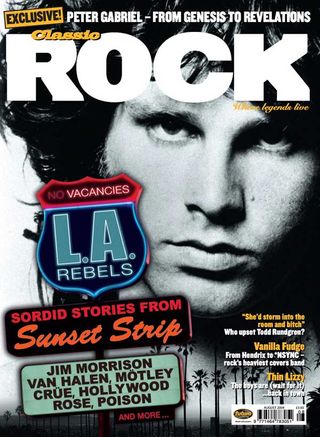
Gabriel’s formative rock’n’roll experiences outdoors the gates of Charterhouse – ceaselessly illicit, which solely added to the fun – had been Otis Redding and The Good. “I bought to see Otis Redding in 1967 on the Ram Jam Membership in Brixton. It was a little bit of a second for me,” he remembers proudly.
“I’ve by no means actually been a technical singer as such, or a musician. I’m somebody who goes for the texture of one thing and tries to construct footage. And listening to the voice and the emotion of Otis Redding was simply past phrases.
“I noticed The Good a number of instances as effectively. I all the time thought The Good bought branded by ELP in some methods. There was a time when Jimi Hendrix needed to affix The Good, and these days folks may look again and marvel why, however if you happen to noticed The Good they had been thrilling each musically and by way of showmanship, which I feel was a part of the enchantment to Hendrix.
“After we [Genesis] wrote The Knife, that was very a lot impressed by [Genesis keyboardist] Tony Banks’s and my enthusiasm for The Good. Horrible title, although. However then phrases had been by no means Keith Emerson’s robust level,” he provides.

However that was a few years down the road. Again contained in the Charterhouse gates, merely forming a band was thought to be an act of insurrection in opposition to the institution, no matter how whimsical the early efforts of Gabriel, Banks and their college mates Michael Rutherford and Anthony Phillips really had been.
Their early band names – The Anon, The Backyard Wall – are testomony to their diffidence, though musically they had been well-organised from the beginning. Gabriel had steered they name themselves Gabriel’s Angels, which may have laid him open to Keith Emerson-style criticism, however the others weren’t impressed.
In actual fact they got the title Genesis by Charterhouse outdated boy Jonathan King, who was the primary to identify their potential. He’d had successful in 1965 with Everybody’s Gone To The Moon and it wasn’t as if they’d many different contacts within the music enterprise, in order that they despatched him a tape. King recorded their first album in ’68, From Genesis To Revelation on the Decca label, which just about no one purchased.
However they knew they might do higher, and as soon as they’d wriggled out of King’s clutches they took themselves off to a rustic cottage simply outdoors Dorking the place they spent six months consuming, sleeping and rehearsing. Other than taking afternoon walks they by no means left the place. As Mike Rutherford later noticed: “We had been far too intense to get pleasure from ourselves.”
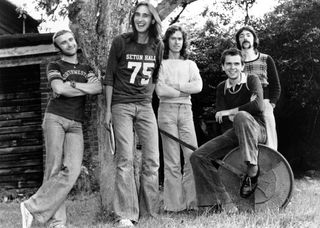
It meant that by the point they began to play gigs they’d a rigorously ready present. However at this level Gabriel turned conscious that he was the one one standing up on stage. “And the others had completely no understanding of the stress that it placed on me,” he remembers. “As a result of I used to be the one who was really having to promote it at gigs.
“And it was quite a lot of strain,” he continues, “as a result of there have been audiences that weren’t in the slightest degree fascinated about what we needed to provide. What’s extra, we had all these twelve-string guitars that needed to be retuned between every quantity. They’d be sitting there in silence, tuning up, and I’d be attempting to hurry it up as a result of I may really feel the vitality from the viewers simply dissipating. That’s once I began, out of desperation, telling tales.”
Gabriel’s monologues quickly turned a characteristic of Genesis gigs because the band constructed up pockets of assist in locations like Aylesbury, Godalming and Bathtub. However progress was painfully sluggish. Regardless of bundle excursions with Lindisfarne and Van Der Graaf Generator – Genesis’s label-mates at their new residence on Charisma – the band’s Trespass (’70) and Nursery Cryme (’71) albums offered pitifully few copies.
“We had been plodders,” Gabriel admits. “I bear in mind, after we’d been going for 2 or three years, speaking with this man who mentioned he was forming a band known as Curved Air. And inside about three months they’d shot previous us into the charts. We had been fairly depressed that they might do way more in a shorter house of time than we may.”
However then Genesis had little or no in frequent with their rock’n’roll friends. Whereas different bands would head all the way down to the fish and chip store or the pub after organising their gear at a venue, the Genesis chaps would get out their lunch bins and chow down on their egg-and-cress sandwiches.

Intercourse and medicines weren’t a first-rate motivation for his or her rock’n’roll, both. “We had examine these issues,” Gabriel observes. And as for the medicine: “I had the odd expertise with hash cigarettes and walked round with the giggles or threw up. It wasn’t doing it for me. A part of it was that I had a really vivid creativeness and I didn’t actually wish to lose management.”
Genesis had been even totally different from different prog-rock bands. They took a democratic, collective method to their music, and there have been no wanton shows of instrumental flamboyance. “It was far more a composer’s method fairly than a participant’s method,” Gabriel agrees. “A few of the different bands had been higher gamers than us however didn’t have the identical method that we did. Tony [Banks] and Steven [Hackett] would have their moments however they had been all throughout the group context.”
One other downside for Gabriel was that whereas his vocals supplied a lot of the songs’ foreplay, the climaxes had been usually instrumentally pushed, leaving him standing round, ineffective and annoyed. “Essentially the most I may do was to bang a tambourine. Really, I ought to have been utilised on a keyboard or another instrument, however that was all all the way down to politics throughout the band.”
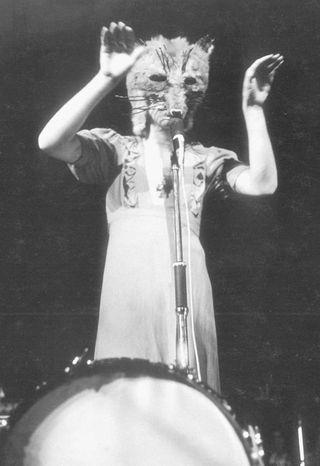
For all of the musical drama Genesis may conjure up, it wasn’t till they developed a visible aspect that they began getting recognition. Gabriel had tinkered with eyeliner and shaving a wedge out of the hair above his brow. Then he donned his spouse’s (he bought married in ’71) Ossie Clark designer costume (“It was a wrestle moving into it”) and a fox’s head for a present in Dublin in October 1972.
“Again then Eire was not the hippest nation in Europe,” Gabriel says, with understatement, “and there was a palpable sense of shock as I walked out on stage. I believed the dressing up was enjoyable, however the remainder of the band had been fairly uncomfortable about it. There was quite a lot of heavy dialogue about whether or not I needs to be doing this type of stuff. However I’m an obstinate bugger, notably when folks don’t need me to do one thing.”
Simply because the others jealously guarded their instrumental domains, Gabriel protected his wardrobe. “After we began the Supper’s Prepared tour I didn’t present the band any of the visible issues I’d deliberate. I believed: ‘If these masks come up for band dialogue they received’t go along with it.’ I knew it could work, however I used to be going to need to do it furtively.
“I introduced them alongside to the rehearsals on the day of the present. And I feel the others realised at that time that they couldn’t cease me as a result of it was too near the present and it could actually rock the boat. Happily the viewers reacted effectively and I bought away with it, though it was a close-run factor.”
The masks included a geometrically enhanced cardboard field, and a faintly ridiculous flower ensemble with Gabriel’s head framed by petals. With the addition of a white muslin curtain behind the band, lit by ultra-violet lights, the viewers now had one thing to give attention to other than their very own footwear.
By way of 1973 and 1974 Genesis developed a cult following. They’d already turn out to be massive in Belgium and Italy, and their new musical tales of thriller and creativeness on the Foxtrot and Promoting England By The Pound albums proved notably common within the industrial cities and cities of northern England. They even virtually had a High 20 hit with I Know What I Like (In Your Wardrobe), but it surely stalled at No.21. And after they began touring America, their strongest areas had been the blue-collar cities of the US Midwest and Canada.
“I feel a few of them had been attempting to flee from their backgrounds, and we had a romanticism that reduce by means of to folks,” Gabriel explains. “We had been far more Harry Potter than The Terminator. The essential factor for me was how a lot feeling we had been in a position to put out, and I feel there was an actual emotion getting by means of at our gigs.”
Emboldened by the band’s success, Gabriel’s stage outfits turned extra elaborate. On a few events he was even hoisted into the air on a wire to sing The Musical Field.
He additionally began getting extra possessive over the lyrics, which brought about ructions with the others who felt that phrases had been a part of the ‘group factor’. Gabriel didn’t assist himself by being late with the lyrics. So it was with some reluctance that the remainder of the band allowed Gabriel to put in writing the lyrics for his or her conceptual tour de drive The Lamb Lies Down On Broadway, despite the fact that it was his idea.
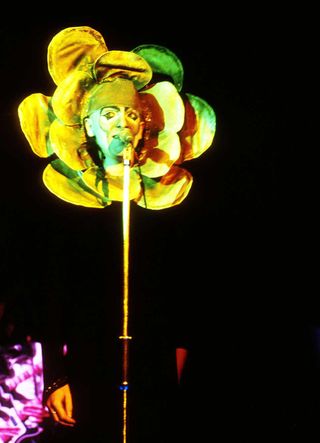
“I insisted, though there have been two songs wherein the others bought concerned as a result of they didn’t need it to be 100 per cent. And I feel that actually was the rationale, though they’d most likely offer you different causes. However I did put a copyright on the little story I wrote on the sleeve, jumbled as it’s, as a result of whereas I used to be an equal contributor on the musical concepts I knew that I used to be doing quite a lot of this work as well as. It was pure ego.”
Ego – or the flattering of it – additionally had an element to play within the episode that almost wrecked Genesis through the recording of The Lamb Lies Down On Broadway. The Exorcist producer William Friedkin had learn an earlier surreal story by Gabriel on the sleeve of their Dwell album, and bought in contact about writing a script. Already behind with The Lamb… lyrics, Gabriel requested the group for break day. Once they refused, he stop. Issues had been resolved solely when their administration warned Friedkin that he was breaking apart the group. Friedkin backed off, and Peter sheepishly returned.
Extra traumatic was the start of Gabriel’s first daughter, who after an advanced start was in intensive care. “We had been recording in deep Wales,” he remembers, “and my daughter was between life and demise in Paddington. So there was this five-hour drive to go to my spouse and daughter. It was completely exhausting.
“The remainder of the band had been sympathetic however they couldn’t perceive. The Band had all the time been The Boss and our responsibility. Our life was our work, and any type of life outdoors this all-consuming entity, whether or not non-public or skilled, was one thing the others discovered fairly threatening.”

His daughter survived, The Lamb… was accomplished after round the clock mixing periods, excursions had been booked, and a brand new present conceived and ready. However Gabriel’s perspective had modified irrevocably. 4 dates into their US tour in late 1974 he advised the band he was leaving, though it was one other six months earlier than he may extricate himself.
“Our supervisor was reserving excursions eighteen months forward, which is regular enterprise apply, however I used to be simply feeling the entire weight of dedication and pondering, when is life going to occur? Is all of it simply excursions and data? I needed to cease each once in a while and have time with my household. However you couldn’t as a result of it was fucking up the band.
“And the irony was that I had all that actually strongly once I mentioned I needed to go away, as a result of we hadn’t paid off our debt and issues had been actually starting to take off and now I used to be fucking it up for them. So the rationale I stayed with the band for a European tour was guilt.
“And the factor that was hardest for me was that I had agreed that so as to give the band an opportunity to construct a brand new identification I wouldn’t say something for an additional six months. And I felt like a fraud. I used to be performing in entrance of all these folks and I couldn’t say something. However unusually sufficient I used to be extra assured that they’d do all proper with out me than they had been.”
However the press and public didn’t see it that manner. When information lastly leaked out and Gabriel wrote a “convoluted letter” to the press, Genesis discovered themselves studying their very own obituaries whereas everybody speculated on Gabriel’s subsequent transfer.
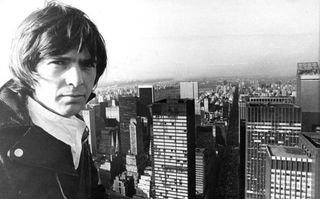
Besides that there was no subsequent transfer. “It was outing fairly than break day,” he explains. “After I left Genesis I needed to be outdoors the music enterprise. At first I used to be simply rising greens and taking care of the child. I additionally checked out this commune that I used to be really fairly critical about becoming a member of. They’d put collectively totally different components of non secular traditions, they usually auditioned potential members with psychological testing and stuff like that. It was fairly a bizarre experiment. Even weirder, it was known as Genesis!
“However the extra I used to be with out music, the extra I realised I nonetheless beloved it and I needed to get again. They usually mentioned: ‘If you happen to do return, we will all determine when you need to go.’ And I believed, grasp on a minute.”
Having rejected Genesis for a second time, Gabriel bought again into the swing of writing songs. However who to play with? Other than his outdated band, he hadn’t actually hung round many musicians, though he had bought to know Robert Fripp, the chief of King Crimson, and a London-based American keyboard participant known as Larry Quick. For Gabriel the prospect of forming a band was daunting.
He ended up going to Canada to work with Bob Ezrin, on the face of it an odd selection. Ezrin had made his title producing Alice Cooper and had not too long ago labored with Lou Reed and Kiss.

“One of many points of interest of Bob was that he appeared actually good at organising folks, and it was good to really feel that a few of that strain was not going to be on my shoulders,” Gabriel explains.
“I used to be very nervous doing the primary periods with him so I took my little English contingent with me, and he launched me to those different musicians, one in every of whom was Tony Levin, who has been my bass participant ever since.
“Bob helped enormously. He’s very gifted. We nonetheless work collectively on initiatives. However at the moment he was additionally a little bit of a coke-inspired management freak. And that will present itself in numerous methods. There was one explicit event when a gorgeous guitar solo from Robert [Fripp] was erased and we didn’t fairly know why. And that created rigidity.
“Then there have been the periods for Right here Comes The Flood, once I wasn’t certain in regards to the drum half so I needed it remoted so I may erase it if obligatory. However once I listened again the drums had been blended in with the orchestra, and there was no manner I may eliminate it. There have been a number of moments like that. However we discovered a manner by means of, and I feel there are bits of that album [the first Peter Gabriel] which are actually good and targeted. There’s just some bits the place it goes off the rails.”
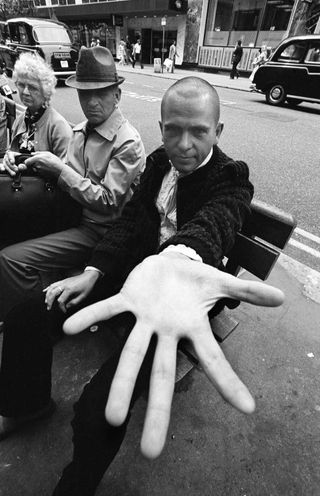
By now it was 1977 and, as Gabriel had predicted, Genesis had already risen, phoenix-like, and had been extra commercially profitable than ever. Out of the blue it was ‘Peter who?’ Thank goodness, then, for Solsbury Hill which gave Gabriel a High 20 hit and the publicity he wanted to launch his solo profession. “That was one thing Bob Ezrin stored pushing me to complete. He’s excellent at motivating folks to get on with writing.”
His first tour that 12 months put additional distance between him and his former band – no dramatics, no costumes, only a easy however efficient mild present. “I used to be positively attempting to not play Genesis songs, though I did do Again In New York Metropolis. And there have been a few covers – Marvin Gaye’s Ain’t That Peculiar and The Kinks’ All Day & All Of The Night time – which had been outdoors the prog-rock background I used to be related to.”
He had additionally been eager about the barrier between the performer and the viewers, and “how far more fascinating it could possibly be if you happen to tried to interrupt by means of that”. The newly developed radio microphone gave him the primary likelihood: he’d disappear off stage through the introduction to Ready For The Massive One and reappear behind the stalls or the balcony earlier than making his manner again to the stage by means of the viewers.
“You couldn’t pre-programme the present if there was a bodily interplay with the viewers,” he explains. “They may decide how lengthy you had been on the market. It actually added a way of alive-ness to the present. As a result of I used to be placing myself in a spot that was doubtlessly weak. And issues like belief begin to come into play.” In a while he would take {that a} massive step – or fall – additional.
Having now put clear daylight between himself and Genesis – and had successful single as effectively – Gabriel now needed to determine which approach to go on the subsequent album.
“I used to be frightened about getting drawn again into the pop factor. So the second album was a deliberate try and go some other place, and I requested Robert Fripp to supply it. He mentioned: ‘That’s a beautiful thought. We’ll do the entire thing in six weeks. No pussyfooting round.’ I believed that sounded thrilling and I made a decision to go for it.
“However what I learnt was that I don’t do good work in a rush. I could get moments of issues, however not a correct physique of labor. The songs weren’t nearly as good as they might have been, the lyrics weren’t nearly as good as they might have been, the preparations actually weren’t nearly as good as they might have been, and the sounds weren’t nearly as good as they might have been.
“It took till the subsequent report to seek out out what I used to be as a solo artist, or could possibly be. That was within the framework of feeling extra settled with the band, and having the nice group of [producer] Steve Lillywhite and [engineer] Hugh Padgham.”
The framework for that third album additionally included an odd rule: no cymbals. “I’d been eager about the issues I didn’t like on rock data,” Gabriel explains, “and one of many issues was cymbals splashing round in every single place. They take up an unbelievable quantity of house within the greater sound frequencies. And if you happen to take them out you give your self a complete nation to discover.
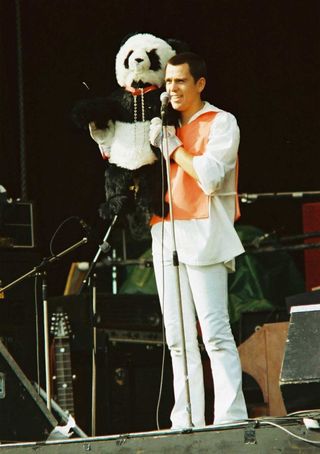
“So I mentioned no cymbals. And that meant that the drummers – primarily Jerry Marotta but in addition Phil Collins and Morris Pert – couldn’t do what they usually do. Out of the blue they needed to assume in a different way. And that affected the backbone of the piece, the rhythm. And every part else.”
Out of that quest for brand new and totally different drum sounds got here the gated reverb, an impact that engineer Padgham had tried out on an XTC album shortly earlier than. “He was enjoying with it within the studio, and I bought fairly excited and requested him to show it proper up. I bear in mind saying: ‘That is going to revolutionise drum sounds.’ I needed to do a monitor that was fully primarily based round that sound. And that monitor was Intruder. Phil was enjoying on that monitor and he bought excited by it too.
“It’s a minor factor, however when folks hearken to that music and say: ‘You took that Phil Collins [In The Air Tonight] drum sound’, that niggles me.”
That sound gave Gabriel’s third album a potent, if ominous, sound that ran from the opening Intruder by means of to the closing anthem Biko. Even the poppy Video games With out Frontiers had menacing undertones. It was all an excessive amount of for Atlantic Data in America, who determined to go on the report. “Apparently after they heard Lead A Regular Life they requested my supervisor whether or not I’d been in a psychological establishment,” Gabriel says. “The top of A&R, John Kalodner, stored wanting me to sound extra like The Doobie Brothers, who had been highly regarded on the time.”

The album – his third to, confusingly, be titled merely Peter Gabriel – turned out to be Gabriel’s most profitable to date in each the US and the UK, justifying his barbed remark about Atlantic’s “short-sighted and bigoted perspective”.
On stage Gabriel, who had now gone skinhead, continued his walkabouts, generally ‘browsing’ the viewers on a chunk of plywood which was carried alongside by 4 robust roadies performing as pall-bearers. When he often fell off, the viewers, removed from ripping him to shreds in a frenzy, helped him again on to the board. From that developed the concept of intentionally falling backwards into the viewers from the lip of the stage.
“I’d accomplished these hippy psychological video games, falling backwards and trusting folks to catch you, so I believed I’d do this on stage and hope that they caught me. Once you go forwards that’s one factor, however whenever you go backwards it’s one other fully. For probably the most half I bought caught. However early on, in San Francisco, they thought: ‘This have to be a part of the act. We’d higher transfer away’. And that damage!”
Even after they caught him the viewers weren’t all the time reverential. “I used to be debagged frequently. And in Chicago I barely held on to my underpants. I clambered again on stage holding my stomach in as greatest I may. In a while I noticed an R.E.M. video the place Michael Stipe dives into the viewers and I believed: ‘Rattling, I ought to have accomplished the video whereas I used to be forward’.”
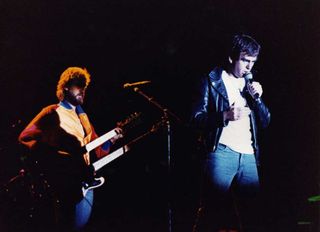
Gabriel’s stage-diving antics started on the mysteriously named ‘Tour Of China 1984’ – it was solely 1980 on the time. “Nicely, there was this massive factor about who could be the primary rock act to play China. I knew I wasn’t going to be the primary, however I believed I would as effectively do the merchandise. And 1984 all the time struck me as a scary 12 months ever since I learn the guide.”
The closest Gabriel really bought to China was when the Tianjin Tune & Dance Ensemble carried out on the first WOMAD Pageant in 1981, which he was closely concerned in. That occasion is now seen because the catalyst for the burgeoning world music scene, however on the time it bankrupted Gabriel and uncovered him to a couple disagreeable realities. Genesis bailed him out with a profit present the next 12 months.
“Folks had been saying: ‘Who is that this fats cat watching us undergo?’ when in actual fact the debt was far extra money than I needed to my title. It was extraordinary to see what occurred when all of it went bankrupt. I bought demise threats, and the liquidators really cast a signature of one of many WOMAD administrators so they might get their reduce of the Genesis profit live performance.”
The Genesis reunion live performance at Milton Keynes the next 12 months paid off the money owed, however Gabriel emphasised the one-off nature of the reunion by getting into and leaving the stage in a coffin.
His personal enthusiasm for world music was evident from the opening monitor of his fourth Peter Gabriel album (titled ‘Safety’ in America), The Rhythm Of The Warmth. “I’d been working with this Ghanaian drum band, Ekome, in Bristol, and that’s the place the ultimate part of that music got here from. Getting that change of rhythm down was extremely thrilling – a type of moments whenever you assume: ‘Nailed it!’ An awesome feeling.”
The unrelenting depth of Gabriel’s fourth album – musically even the hook-laden single Shock The Monkey was like a coiled spring – scuppered its possibilities of being his breakthrough album. “It wasn’t an enormous vendor,” Gabriel confirms. “A few of the hardcore followers assume it’s the most effective report however others thought it was too wacky. Possibly that’s as a result of I used to be taking a much bigger function within the manufacturing.”
The advanced and generally impenetrable movies didn’t assist, both. However dwell the musicians had developed right into a cohesive, energetic unit that attacked the songs’ dynamics with a cavalcade of synthesised rhythms and loops. The stage was sparse, the lights white and vibrant, and ‘the dive’ took on an virtually spiritual significance. David Bowie was so impressed that he took Gabriel together with him on the North American leg of his Critical Moonlight ‘comeback’ tour in 1983.
Gabriel started work on the subsequent album the next 12 months, however bought waylaid by soundtrack initiatives for Birdy, In opposition to All Odds and Gremlins, to not point out home strife and short-term separation from his household. However when So lastly emerged in Might 1986 it was emphatically a case of proper report, proper time.
“It exceeded all our expectations, by way of making music in addition to commercially,” Gabriel admits. “I had attached with Daniel Lanois, who co-produced the album with me, and all the weather had been becoming collectively. However then it’s all the time simpler to look again in hindsight. I imply, despite the fact that Sledgehammer felt robust and the groove was nice it didn’t really feel like an enormous hit report. Folks go: ‘You could have identified it was the industrial monitor’, but it surely wasn’t till we began doing the video that we bought a sense about it.”
The Sledgehammer video was when Gabriel’s difficult concepts had been made accessible. “I feel it was trying forwards and backwards on the similar time,” he muses. “Folks assume it was accomplished with quite a lot of laptop results, but it surely reality it was old school animation methods. It was a sluggish, tortuous course of. And the day I spent surrounded by stale fish that had been underneath the brilliant lights the day earlier than was not a sensual expertise I wish to repeat.”
Nevertheless it labored. Sledgehammer was a worldwide hit – No.1 in America – and the So album topped the UK charts and spent three weeks at No.2 within the US. Lastly, Gabriel was a star and, having stored the music enterprise at arm’s size for 20 years, out of the blue he went high-profile, turning up at awards exhibits.
“I’d prevented all of that stuff and had a really pure, Stalinist line in opposition to the enterprise, however I did embrace the promoting of my music at this level, and I didn’t actually really feel a lot the more serious for it. I didn’t really feel that the angle of bending over had exceeded my pure consolation zone,” he provides with a smile.
The This Manner Up date schedule included all however one of many So songs, and expanded the sunshine and house ideas from the earlier tour. This time Gabriel used cell lighting cranes, which had been at their handiest after they crowded spherical him whereas he sang Mercy Avenue. And the rousing duet with Youssou N’Dour on In Your Eyes was an impressed piece of world music alchemy.
Gabriel was reaching a brand new viewers, drawn in by the movies and his media profile. “It was a pop viewers that I hadn’t had earlier than. And I’m afraid among the cult followers weren’t very pleased to share with the informal viewers,” he remembers.
“After which, simply as every part was starting to wind down, the album bought one other enhance from the Say Something film, with John Cusack holding up a radio enjoying In Your Eyes as a Valentine’s Day providing for his girlfriend. You by no means fairly know when these exterior occasions are going to assist or hinder you.”
Sometimes, Gabriel managed to dissipate a lot of his new-found rock-star standing by taking six years for the follow-up, Us. Admittedly there was one other soundtrack (Ardour) and a compilation (Shaking The Tree) in between, however he acknowledges an virtually wilful intent: “I’ve tended to comply with a profitable album with a much less profitable album. I feel I’ve protected myself with obscurity each time I used to be threatened with success.”
Us might have offered solely round half of what So did, but it surely most likely wouldn’t have offered far more even when it had come out 4 years earlier. The place So was direct and accessible, Us was pristine however introspective. The cult following had their man again once more. “I didn’t really feel the manufacturing caught the vitality generally, however I felt good in regards to the songs,” Gabriel displays.
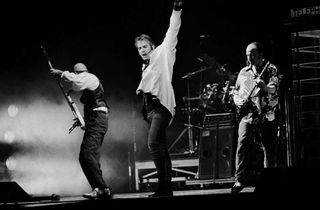
The accompanying Secret World tour was an formidable leap into the unknown. It was the brainchild of acclaimed designer Robert Lepage, who, Gabriel says, “creates theatre for individuals who go to the cinema. It was not nearly phrases and efficiency, it had what I name a excessive moisture content material – a mysterious surroundings, if you happen to like – and I needed to see if we may incorporate that into our present”.
Set within the spherical, the set had two phases with a walkway between. “There was the male sq. stage and the feminine spherical stage, and clearly some random stereotyping in that sense,” Gabriel explains. “However having two locations to go, the sensation of enjoying two phases, was fairly totally different from the standard present the place everyone’s pointing the identical manner and the vitality goes in the identical route.”
However regardless of the present’s complexity there have been no dazzling impacts to wow the viewers. “A number of acts had been within the ‘weapons race’ again then: what number of lights you possibly can have, that type of factor,” Gabriel says. “We went out with a couple of tenth of the weapons of a few of these bands, however we had been attempting to make use of them in a extra fascinating manner. I feel it’s an essential distinction; it’s not all about amount.”
A few of it was about choreography, although, given Lepage’s theatrical background, and among the band needed to study to skip in unison. However skip they did because the Secret World tour traversed the globe for many of 1993 and 1994, visiting international locations off rock’n’roll’s overwhelmed monitor like India, Egypt, Chile and Venezuela.
The six-year hole between So and Us paled compared to the ten-year await Up, which ultimately arrived in September 2002. “It’s a bookends report,” in accordance with a now 50-something Gabriel, “trying extra initially and finish of life than the center.”
Songs about demise (I Grieve) and childhood fears (Darkness) will not be apparent rock’n’roll subject material, though they’re damaged up by some thunderous metallic beats and rhythms, in addition to the life-affirming Extra Than This and a caustic satire on actuality TV (The Barry Williams Present).
“To start with, Up bought some actually dangerous opinions,” he admits. “Rolling Stone gave me a stinker, which was fairly disappointing as a result of I felt I’d labored bloody onerous at it and it has a few of my greatest work. It’s taken some time, however not too long ago I’ve had musicians come as much as me and say it’s my greatest report. Which is a few comfort.”
And in the event that they didn’t just like the report, the critics have been effusive in regards to the newest Nonetheless Rising Up tour. Final time, Lepage and Gabriel unfold out horizontally, this time they’ve gone upwards. “We determined to attempt to create ranges and variations vertically, in order that you find yourself successfully with a heaven stage and an earth stage and a method of shifting issues – and other people – up and down.”
Which is how Gabriel and his daughter Melanie come to be strolling the other way up on the underside of heaven, singing Draw back-Up (from Gabriel’s OVO Millennium present – about the one factor to emerge from the Millennium Dome with any credit score).
“Really I used to be dreading that,” Gabriel confesses. “Whereas Robert and I had been engaged on the concept somebody had really fallen. And my daughter was going to be requested to do that, so I needed to make doubly certain it was secure. The primary time she did it dwell I used to be very emotional. I used to be eager to be protecting and supportive however on the similar time I simply needed to sit down again and luxuriate in it.”
The Nonetheless Rising Up tour does have some devices to impress the viewers: the Zorg ball, an enormous, clear hamster wheel inside which Gabriel walks whereas singing Rising Up. His unique intention was to stroll out over the heads of the viewers in a novel departure from his earlier stage diving. “Nevertheless it was identified to me that the mixed weight of the ball and my not inconsiderable weight may flatten some smaller members of the viewers.” There’s additionally the jacket of lights that he wears for Sledgehammer, and the bike he rides across the stage whereas singing Solsbury Hill.
“One of many issues I get pleasure from most is brainstorming with fascinating folks,” Gabriel says, “and doing a really visible tour offers me the prospect to try this. The massive manufacturing stuff is one thing I‘ve all the time loved, proper from the early days of Genesis.”
In a wardrobe of his there most likely nonetheless lurks a pink costume and a fox’s head.
This characteristic was initially revealed in Basic Rock 69 (August 2004)

